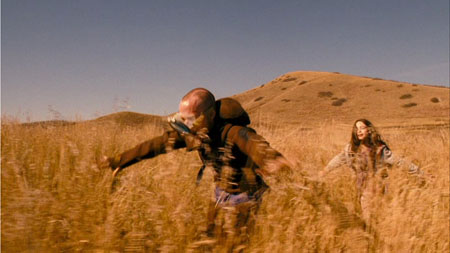DIRECTED BY: Stuart Gordon
FEATURING: William H. Macy
PLOT: A latently racist and mentally addled accountant leaves his wife, spends an impossibly long night touring the NYC commercial sex trade and meeting lost souls, and finally ends up in prison.

WHY IT WON’T MAKE THE LIST: Edmond isn’t so much weird as terminally confused. It’s true that foreboding Tarot cards keep popping up in impossible places, that Macy’s wild night out is almost impossibly long so the script can fit in all the necessary episodes, and that it’s extremely odd that the prison wardens would march new meat past inmates’ cells in the buff. Still, even with these departures from reality, the movie still doesn’t seem in-your-bones weird so much as it feels like the author (playwright David Mamet) is trying to force events into a meaningful symbolic line, but failing to communicate that meaning to his audience.
COMMENTS: Edmond is only for William H. Macy fans and for those who equate vagueness with profundity. Macy creates some interest, though no sympathy, through his performance as a sad sack salaryman who thinks he’s found a temporary fix for existential bafflement by tapping into his tribal bloodlust. After whoremongering, assaulting women and minorities, threatening old churchgoing ladies, and other more serious crimes, he finds himself under arrest. In prison he’s forcibly stripped of his recently adopted macho facade, and spends his time in stammering attempts to articulate some profound philosophy of life (“every fear hides a wish”). Unfortunately, Macy wanders through a script that doesn’t know what to make of Edmond any more than Edmond himself does. Those recurring Tarot cards and the closing monologue suggest that it was all just fate anyway, and Edmond’s search for meaning and the choices he made never made a difference. In the end, all that happens is we passively witness an inexplicable tragedy happen to an unlikeable man.
Although Edmond‘s angry white male sociopath seems like a faded nth-generation variation of Michael Douglas’ D-Fens from Falling Down (1993), Mamet’s original play was actually written during the first term of the Reagan administration. The concept of the angry white male (who Democrats theorized jumped the fence to get Reagan elected) would have had more resonance in that era. That theory may also explain why Edmond is named after Edmund Burke, the Irish philosopher/statesman who is looked upon as the father of modern conservatism. Maybe that explains why both the character Edmond and the movie Edmond seem strange and unmotivated to us today, viewing the film in a different political context. It also demonstrates why writers should not write to their times (or, at least, should not resurrect old pieces without revising them).
WHAT THE CRITICS SAY:


